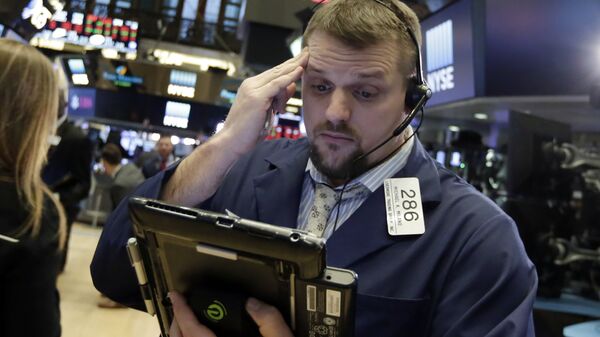The Dow Jones Industrial Average dropped 53.23 points to 25,863.60 in morning trading on Tuesday, with the S&P 500 down 4.35 points, or 0.15 percent, to 2,989.81 as of 10:05 eastern standard time following the release of the ISM's new report on US manufacturing activity, which showed a greater than expected drop.
Moments before the report was released, the Dow was up 113.19 points, while the S&P was up 13.07.
The Nasdaq Composite Index managed to avoid slipping into negative territory in morning trading, and was still up 12.18 points, or 0.15 percent, at 8,011.52 as of 10 am, but also shed early morning gains, where it had reached a high of +58.08 points.
US manufacturing activity began contracting in August amid the ongoing US-China trade war, and continued its slide in September (down from 49.1 to 47.8). Ahead of that data's release, market watchers had expected the ISM rating to reach 50.1, meaning a slight expansion.
Eurozone Manufacturing Also Down
Earlier, Reuters reported that the euro zone data had showed that manufacturing activity across the bloc of countries had declined to its steepest rate in close to seven years, with the multi-trillion dollar trade war between Washington and Beijing, as well as fears related to Brexit thought to pose risks to growth.
Also on Tuesday, the latest report by the IHS Markit/CIPS UK Manufacturing Purchasing Managers' Index showed that the UK's industrial sector had continued its fifth month of shrinkage in a row, the longest consistent decline since mid-2009.
Commenting on the ISM figures, Torsten Slok, chief economist at Deutsche Bank Securities in New York, said the news was "serious," telling Reuters that "There is no end in sight to this slowdown," and that "the recession risk is real."
The Trump administration began slapping tens of billions of Chinese goods with tariffs in May 2018 in a bid to reduce the US economy's dependence on China and to revitalise at least some of the US's industrial base. Industry's nominal share of the US economy has seen a steady decline since the 1970s, dropping from about 20 percent of the economy in 1980 to less than 15 percent by the mid-2010s. Trump has attempted to remedy the problem by slapping virtually the entirety of Chinese imports into the US with duties, and introducing tariffs on steel, aluminium and other imports from other countries.



